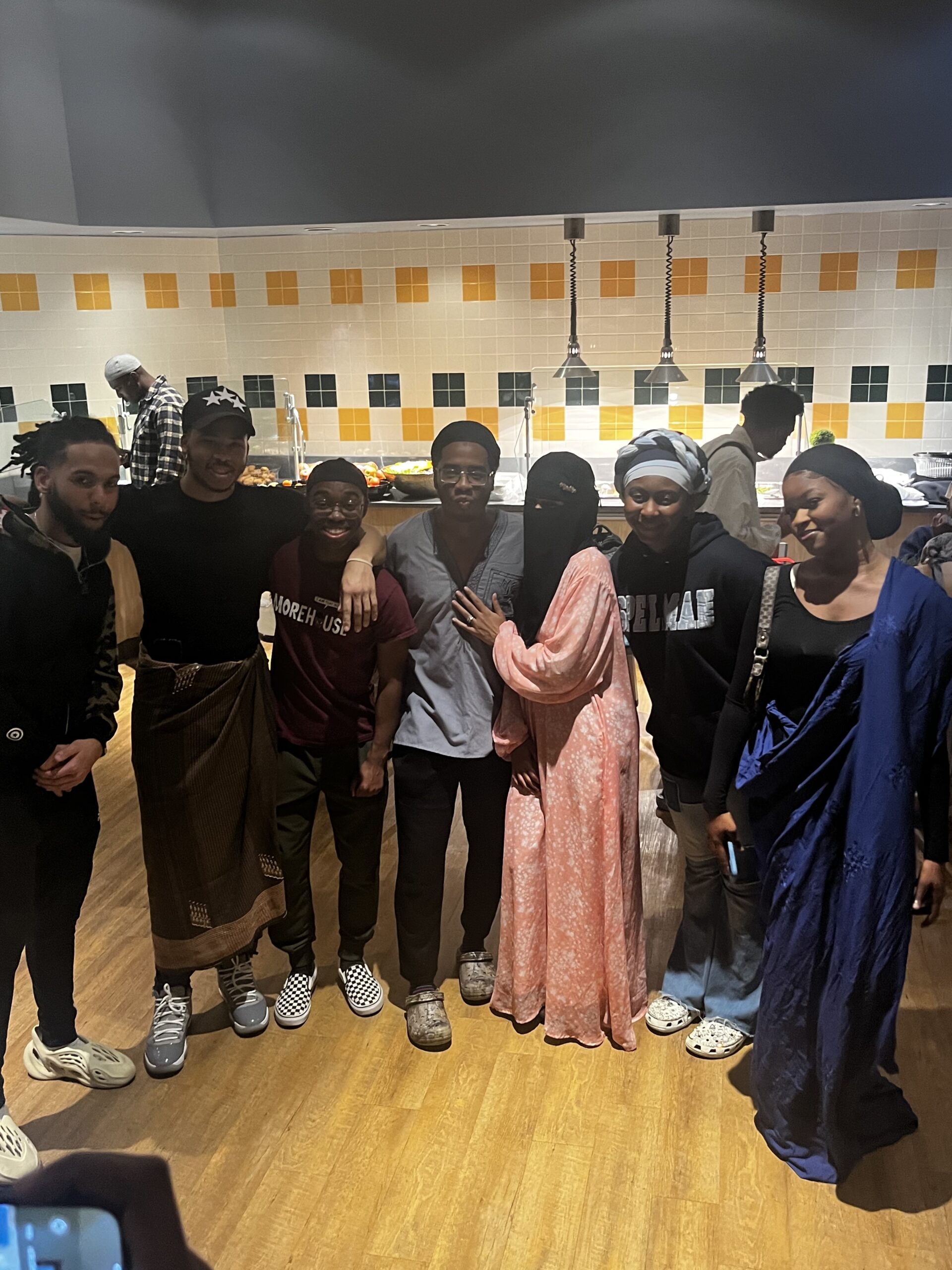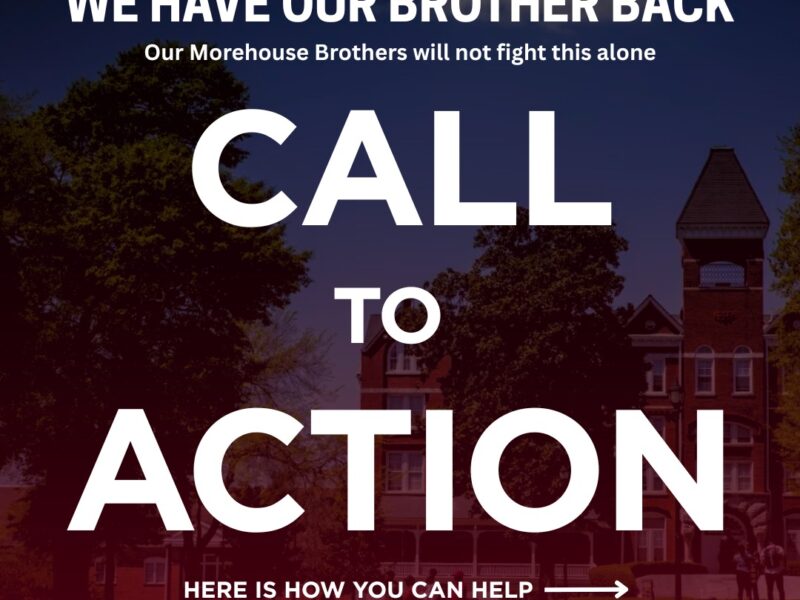AUC STUDENTS COME TOGETHER TO OBSERVE RAMADAN

Photo by: Thishin Jackson
By Thishin Jackson, Staff Writer
On March 22, members of the Muslim Student Association (MSA) along with Muslims worldwide welcomed the start of Ramadan and with it 29 – 30 days of fasting from sunrise to sunset.
Ramadan, a holy month in the Islamic faith, began at the sighting of the crescent moon. Pew Research Center estimates there were 1.8 billion Muslims in the world as of 2015 – roughly 24% of the global population.
The Muslim Student Association held Iftar on the evening of March 23 in the Alma Upshaw Dining Hall at Spelman College following the first full day of fasting. Iftar is the meal Muslims have at the end of a day of fasting during Ramadan. It is a significant time when Muslims come together to pray and eat as a community, celebrating a successful day of fasting.

Photo By Thishin Jackson
This was the first Iftar at the Atlanta University Center (AUC) in four years, partly due to COVID-19. Students wanted to come together, celebrate fast in Ramadan, and have Iftar as a Muslim community.

Photo By Omari Whiting
The President of the MSA, Spelman College graduating senior Rosie Stewart-Walker, and her husband, MSA Vice President and Morehouse College graduating senior Joseph Walker, worked with MSA members, preparing for a month of fasting, worship and community.
Walker told the Maroon Tiger, “We are a student association, and it’s kind of like Muslims’ home away from home. We know how tough it can get for Muslims to come from all around the country and the world to a college, a Baptist college at that, and not feel the inclusivity and not feel welcome. We make sure you can still be on top of your Deen [religion] here. That’s one thing that Rosie and I wanted to ensure, that we had a sense of welcomeness here.”
Iftar will continue to be held in Spelman’s dining hall at sunset Monday through Friday until the end of Ramadan. Additionally, MSA members will be provided box meals for Suhoor, the meal Muslims eat before sunrise at the start of a day of fasting.
“This is the first day of Ramadan, the first day of fasting, so everyone today was able to break their fast after a long day of not eating, not drinking, abstaining from sin, and they get to come here and [observe Iftar] with their family,” Stewart-Walker said. “I think it’s even more difficult to be in college, to have Ramadan and to have nowhere to be, not only nothing to eat, but you don’t have people around you who are your family. This was specifically catered to the idea of creating the Muslim family within the AUC.”
Walker said, “My wife and I really wanted Ramadan to be predominant on campus. I’ve been here four years, really 2 1/2 years due to COVID. During my freshman year, I didn’t really have that Ramadan experience; I found myself fasting alone. My junior year was when my wife and I became a part of the E [executive] board of MSA.”
He added, “We are graduating seniors now; as the saying goes, we have nothing to lose. This year we want to ensure that MSA was set in place so that they have a playbook to go by after my wife and I graduate. We want to make sure that not only are Muslims observing Ramadan, but the campuses across the AUC are also aware of Ramadan.”
MSA member Christian German, a freshman at Morehouse, said, “Iftar is pretty much where all the Muslims in the AUC can come together to break our fast as one. It is honestly a big morale booster just seeing other Muslims in the AUC come together and break-fast together, joke around, eat and come together as one.”
Omari Whiting, a non-Muslim Morehouse freshman, attended the Iftar. “I felt very grateful for the chance to participate. I also felt very comfortable participating as members of MSA welcomed me and treated me like I was one of their own,” Whiting said.
Noah Collier, a junior at Morehouse and MSA member, explained, “Islam is not something that can be practiced in isolation; it is an inherently community religion. When we gather, it is one of the most important aspects of the religion we participate in. Observing Ramadan together has great significance.”
Spelman College is the primary supporter of the MSA Ramadan activities.
Mariama Diallo, a First Year at Spelman, serves as chair of the Ramadan Committee. She has been working closely with the food services offices at Spelman and Morehouse to coordinate the Iftar.
Diallo said, “We’ve been working very closely with [Spelman’s] religious department. We have collaborated with Aramark, which is our food provider, to support Iftar to make sure that everybody across the AUC has a safe space to pray and break their fast.
“Spelman has provided the space for Iftar and other Ramadan-related events that we plan to do throughout the months,” Diallo said. “They’ve been very instrumental in the MSA program and process. Really, it’s just been a sign of an interfaith community all around.
“We have just met with Aramark at Morehouse, and its cafeteria is going to support the Morehouse students’ financial contribution to the food for Iftar,” Diallo said.
This year, Iftar has been significant for German since he became Muslim.
“This is my first time ever [participating in] an Iftar,” German said. “This is very special to me.”
On April 8, all students in the AUC are invited to participate in Ramadan with the Muslim Student Association.
“It’s something we’re calling ‘Fast with Us,’ a day in which we invite non-Muslims across the AUC to come and spend the day fasting with the Muslims across the campuses. We will fast with them all day; we will have a full day of programming,” Diallo said.
Whiting has chosen to fast during this month. “Ramadan is a tradition that I have seen my Muslim friends take part in. I wanted to participate and fast so that I can learn more about my friends’ religion and connect with them on a more personal level,” he said.
Diallo added, “It’s very visual, and we’re out there; you know we’re making our presence known because many people do not know much about Islam or other religions outside of their own. I think that it is important to have events like this to promote a greater understanding of the faith but, as I mentioned earlier, to promote interfaith unity.
“The significance of Ramadan is not lost on the MSA. I cannot put a value to it; the magnificence of it is only comparable to itself.”
Non-Muslims may greet a Muslim by saying Ramadan Mubarak meaning happy Ramadan. The traditional response is Ramadan Kareem, which means blessed Ramadan.
Copy Edited by Bennie Williams, Campus News Editor






